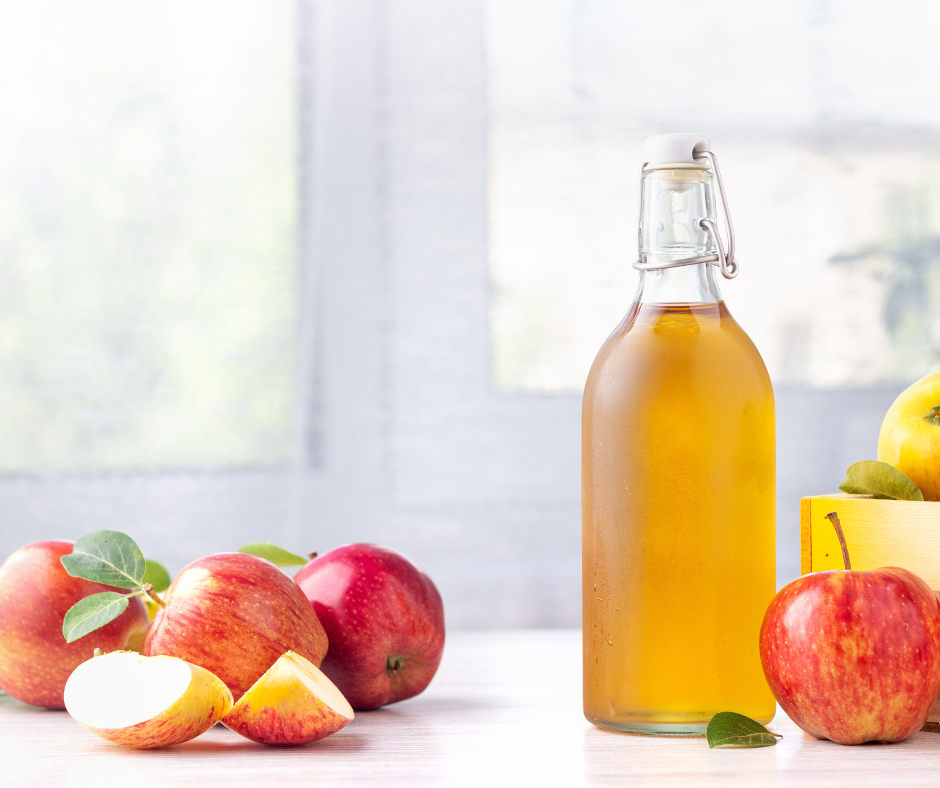Is Apple Cider Vinegar the Most Useful Home Remedy?

The Health Benefits of Apple Cider Vinegar
Apple cider vinegar (ACV) is one of the most popular and well known natural remedies all around the world, and one that many have heard about if not tried themselves. And it is time tested as it has been used for centuries for a variety of health issues, including preventative care. Is ACV the most useful of all home remedies, as many claim? Read on and if you haven’t already, try it for yourself, and then you decide if it’s a fit for you.
ACV is made by fermenting crushed apples (ideally organic apples), resulting in a vinegar rich in acetic acid, enzymes, and lots of beneficial bacteria.
While scientific research on the health benefits of ACV is limited (because there is no profit to be made from it perhaps?), there is plenty of evidence to suggest that ACV may offer several health benefits. Let’s look at just a few of its potential health benefits:

- Blood Sugar Control: Several studies have indicated that ACV may help regulate blood sugar levels. A study published in the Journal of Evidence-Based Integrative Medicine found that consuming ACV before a high-carbohydrate meal improved insulin sensitivity in individuals with insulin resistance (1). Another study published in the Journal of Diabetes Research demonstrated that ACV reduced post-meal blood sugar levels in individuals with type 2 diabetes (2). These findings suggest that ACV may be helpful in managing blood sugar levels.
- Weight Management: ACV has been associated with weight loss and improved body composition. A study published in the Journal of Functional Foods found that consuming ACV led to reduced body weight, waist circumference, and visceral fat in overweight individuals (3). Another study published in the European Journal of Clinical Nutrition reported that ACV increased feelings of fullness and reduced calorie intake throughout the day (4). These findings suggest that incorporating ACV into a proper human diet may aid in weight management. I should mention here that adding a couple teaspoons of ACV to my water, morning and night has really helped decrease my cravings to snack!
- Digestive Health: ACV has been traditionally used to support digestive health. It is believed to promote the production of healthy digestive enzymes, aiding in the breakdown and absorption of essential nutrients. Additionally, the acetic acid in ACV may have antimicrobial properties, helping to combat harmful bacteria in the digestive system. While scientific research of easily accessible home remedies is limited, anecdotal evidence suggests that ACV may alleviate symptoms of indigestion, bloating, and heartburn.
- Antioxidant Properties: ACV contains many antioxidants that help protect the body against oxidative stress. A study published in the Journal of Agricultural and Food Chemistry found that ACV exhibited antioxidant activity, reducing oxidative damage in cells (5). Antioxidants play a crucial role in neutralizing harmful free radicals, which are associated with various chronic diseases. Incorporating ACV into the healthy diet may contribute to overall antioxidant intake and support cellular health.
- Skin Health: ACV is widely used as a natural remedy for various skin conditions. Its antimicrobial properties may help combat acne-causing bacteria, while its acidic nature may help balance the skin’s pH levels. A study published in the Journal of Cosmetic Dermatology found that applying a topical solution containing ACV improved the symptoms of acne (6). However, it is important to note that undiluted apple cider vinegar may cause skin irritation, so it should always be used in diluted form.
How to Include Apple Cider Vinegar in Your Diet:
Having recognized a few of the numerous benefits of integrating ACV into our dietary practices, let’s delve into optimizing the use of this potent home remedy. Ensuring the proper dilution of ACV is crucial to prevent unwanted acidity. Here is an overview of how to safely add ACV to your diet:

- Choose the right type of apple cider vinegar: Look for raw, unfiltered, and organic ACV that contains the “mother.” This cloudy substance contains beneficial enzymes and bacteria. I love to make my own vinegars. The process of sourcing the organic apples and filling the jars is satisfying and very worth the effort imo!
- Start with small amounts: Begin by adding 1-2 teaspoons of ACV to your diet per day. This allows your body to adjust to the acidity gradually. I find that my body only needs a couple teaspoons at most, twice a day.
- Dilute it in water: Mix the ACV with a larger amount of water to dilute its acidity. Start with 8 ounces of water and, if you desire, gradually increase the amount of vinegar as your body tolerates it.
- Use ACV as a salad dressing: Create a healthy salad dressing by combining ACV with extra virgin olive oil or the healthy oil of your choice, herbs, and spices. This not only adds flavor but also enhances the nutritional value of your meal.
- Incorporate ACV into marinades and sauces: Apple cider vinegar can be used as a marinade for meats or as an ingredient in sauces. Dilute it with other liquids like lemon juice, soy sauce, or bone broth to balance the acidity. I love to use ACV as a condiment for meat!
- Mix ACV with herbal tea or smoothies: Add a small amount of ACV to your herbal tea or smoothies for a tangy twist. Start with a teaspoon and adjust according to your taste preferences. This is a great way to get ACV into a child’s diet!
- Avoid direct consumption: Never consume apple cider vinegar undiluted, as it can damage tooth enamel and irritate the throat and digestive system.
- Monitor your body’s response: Pay attention to how your body reacts to ACV. If you experience any discomfort, such as heartburn or digestive issues, reduce the amount or frequency of consumption.
- Consult a healthcare professional: If you have any underlying health conditions, such as acid reflux or diabetes, or if you’re taking medications, it’s advisable to consult a healthcare professional before adding ACV to your diet.

Remember, moderation is key when incorporating ACV into your diet. By diluting it properly and listening to your body’s response, you can enjoy the potential health benefits without experiencing excessive acidity.
How to Use ACV for Acne and Skincare:
Apple cider vinegar can be a useful natural remedy to combat acne! Here’s a simple method to incorporate it into your skincare routine: Start by diluting the organic ACV (with the mother) with water in a 1:3 ratio, meaning one part vinegar to three parts water. Cleanse your face with a gentle cleanser and pat it dry. Then, using a cotton ball or pad, apply the diluted ACV to the affected areas of your skin. Let it sit for about 5-10 minutes before rinsing it off with water. Follow up with a moisturizer suitable for your skin type. It’s important to note that, like any home remedy, ACV may not work for everyone, and it’s always a good idea to do a patch test on a small area of your skin before applying it to your entire face. If you experience any irritation or discomfort, discontinue use.
_____
While further research is needed to fully understand the health benefits of ACV, existing studies and plenty of anecdotal evidence suggest that it may offer several advantages. From blood sugar control and weight management to digestive health, antioxidant properties, and skin health, apple cider vinegar has shown promise in various areas. However, it is essential to use ACV in moderation, do your research and consult with a healthcare professional if needed before incorporating it into your routine.
Hope you find this article helpful!
Grace Armstrong

Citations:
1. Johnston CS, et al. Vinegar Improves Insulin Sensitivity to a High-Carbohydrate Meal in Subjects With Insulin Resistance or Type 2 Diabetes. J Evid Based Integr Med. 2013;18(4):251-254.
2. Mitrou P, et al. Vinegar Consumption Increases Insulin-Stimulated Glucose Uptake by the Forearm Muscle in Humans with Type 2 Diabetes. J Diabetes Res. 2015;2015:175204.
3. Kondo T, et al. Vinegar Intake Reduces Body Weight, Body Fat Mass, and Serum Triglyceride Levels in Obese Japanese Subjects. J Funct Foods. 2009;1(2):155-160.
4. Ostman E, et al. Vinegar Supplementation Lowers Glucose and Insulin Responses and Increases Satiety After a Bread Meal in Healthy Subjects. Eur J Clin Nutr. 2005;59(9):983-988.
5. Budak NH, et al. Effects of Apple Cider Vinegars Produced With Different Techniques on Blood Lipids in High-Cholesterol-Fed Rats. J Agric Food Chem. 2011;59(12):6638-6644.
6. Park J, et al. A Randomized Controlled Trial of 5% Topical Tea Tree Oil Gel in Mild to Moderate Acne Vulgaris. J Cosmet Dermatol. 2017;16(4):458-464.

